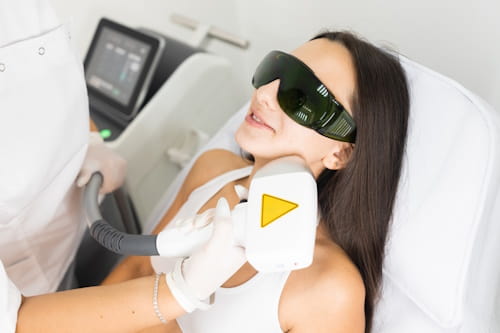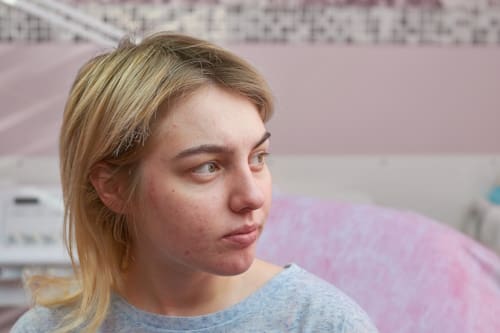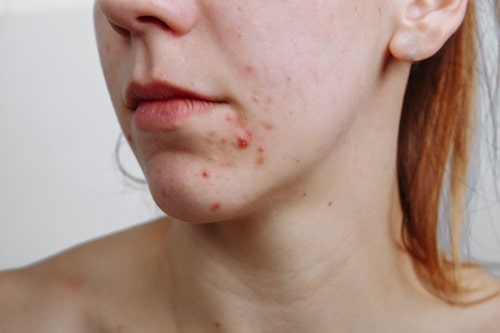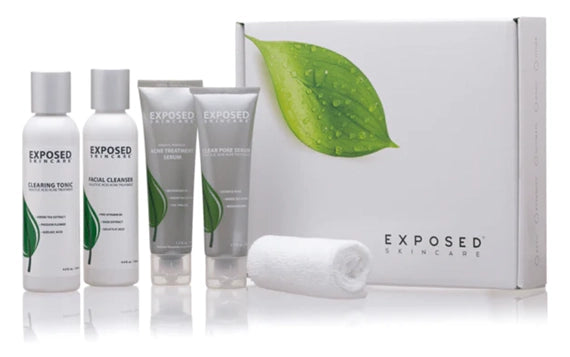Laser hair removal has recently become a popular cosmetic treatment to eliminate unwanted hair. But what if you also have acne? Some people believe that laser hair removal can cause acne. There are compelling reasons to steer clear of laser hair removal if acne is a concern.
This article dives into the three reasons why laser hair removal may not be your best choice if you are worried about acne. We will explore the side effects, risks, and misconceptions surrounding this common treatment.
Also read: How to choose the best acne treatment
Biggest Take-Aways:
- Laser hair removal is not an effective acne treatment and can exacerbate the condition.
- The procedure does not address the underlying causes of acne and is not designed to reduce acne scars.
- Laser hair removal can be a costly and risky investment for those looking to treat acne.
- Exposed Skin Care offers a specialized, comprehensive, and less risky approach to treating acne effectively.

Reason 1: Laser Hair Removal Can Exacerbate Acne
You might think laser hair removal could help reduce or even treat acne. After all, the process involves using laser heat to destroy the hair follicles, reducing hair growth. However, this is far from the truth. In many cases, laser hair removal can exacerbate acne.
How Laser Treatment Affects Acne
Heat from the Laser
The laser heat used in the hair removal process can irritate the skin, causing inflammation and red bumps resembling pimples after laser hair removal. This irritation is not just temporary but can lead to longer-term acne breakouts.
Pore Clogging
Dead skin cells can get clogged in your pores following laser hair removal, leading to acne spots and inflammation. Removing the hair can disturb the skin's natural balance, making it more susceptible to clogging.
Skin Irritation and Inflammation
Skin irritation is a common side effect of laser hair removal. When you combine skin irritation and inflammation with the presence of acne, the results can be far from ideal.
What Happens After the Laser Hair Removal Session
Many people experience acne breakouts after their laser hair removal session. This is due to the irritation and heat from the laser affecting sensitive or acne-prone skin.

Aftercare is essential following laser hair removal. Yet, the products often recommended to keep your skin clean and reduce irritation can actually exacerbate acne.
Reason 2: Laser Hair Removal Doesn't Treat The Underlying Causes of Acne
The Limitations of Laser
While laser hair removal may seem promising to treat and even prevent acne, the reality is quite different. It's crucial to understand that laser hair removal doesn't address the underlying causes of acne.
Not a Cure for Acne
The laser used in hair removal treatments is designed to destroy the hair follicles. While this effectively removes unwanted hair, it doesn't do anything to treat acne or prevent future breakouts.
Other Treatment Options
Several more effective treatment options are available for acne, such as medications or other forms of skincare. However, these are beyond the scope of laser hair removal acne treatments.
Risk of Developing Acne
Changes in Skin Condition
Your skin condition can change after undergoing laser hair removal. The treatment area may show irritation, increasing the risk of developing acne.
When Body Tries to Get Rid of Unwanted Hair
When the body tries to get rid of unwanted hair naturally, it often involves processes that help to keep the skin healthy. Laser hair removal disrupts this, potentially leading to problems like skin irritation, red bumps, and acne.

Reason 3: The High Cost and Questionable Benefits
The Financial Investment
Laser hair removal is a significant financial investment, especially when considering multiple sessions for effective hair removal. Adding the possibility of acne and pimples developing as a side effect becomes a costly endeavor with questionable benefits.
Questioning the Efficacy
Treatment for Excess Hair, Not Acne
Laser hair removal is an excellent method for removing excess hair, but it is not an acne treatment. If you're looking to treat and prevent acne while also dealing with unwanted body hair, laser hair removal is not the way to go.
Is It Worth the Risk?
Given the potential for skin irritation and inflammation, increased acne breakouts, and the high cost, you may need to question whether laser hair removal acne treatments are worth the risks.
The Benefits of Using Exposed Skin Care for Acne Management
If you're grappling with acne, getting laser hair removal may not be the smart move. While some believe that laser hair removal can help acne, the opposite is more likely to be true. Exposed Skin Care is an effective alternative for managing acne without the risks associated with laser hair removal.
Here's why Exposed Skin Care is a smarter choice:
- No Risk of Additional Skin Irritation: Unlike skin after laser hair removal, which can irritate acne, Exposed Skin Care focuses on gentle yet effective treatment.
- Specifically Formulated for All Skin Types: Exposed Skin Care products are suitable for your skin type, whether you have severe acne or just occasional breakouts.
- Comprehensive Skin Care: You get a holistic acne solution from cleansers that keep your skin cool and remove excess fluids to serums that tackle swelling caused by excess fluids trapped in the pores.
- Targets Acne Causes: Instead of just reducing the amount of hair like other hair removal methods, Exposed Skin Care products target the root causes of acne.
- Promotes Healthy Skin: It's not just about managing acne; the goal is to care for your skin in a way that promotes overall health.
So, rather than picking at acne or opting for treatments that may worsen your condition, focus on proven methods to cleanse the skin and achieve long-lasting results with Exposed Skin Care.
Conclusion
The allure of using laser hair removal to help acne is strong, but as we've seen, this cosmetic procedure has several pitfalls that can actually worsen your skin condition. The heat and irritation caused by the laser can exacerbate existing acne, making it a less-than-ideal choice for those trying to manage acne.
Moreover, laser hair removal does not treat the underlying causes of acne. While it can effectively reduce unwanted hair, it does little to address the factors that cause acne in the first place. Hence, its efficacy as an acne treatment is questionable at best.
There are also financial considerations to keep in mind. Laser hair removal can be costly, and the risk of your skin condition worsening can make it a poor investment. When you factor in the potential for skin irritation and acne scars, it becomes clear that laser hair removal can cause more problems than it solves for acne sufferers.
That said, there are effective ways to manage acne without these risks. One such alternative is Exposed Skin Care, a product line designed to treat acne at its root, catering to all skin types. It's a comprehensive solution for those looking to truly manage their acne without the pitfalls associated with laser treatments.
In conclusion, while you may be tempted to get laser hair removal as a potential solution for acne, the risks far outweigh the benefits. A more effective and less risky strategy would be to focus on specialized acne treatments that target the root causes, providing a long-lasting solution.
FAQs
Can laser hair removal help acne?
No, laser hair removal is not an effective acne treatment and can worsen the condition by causing skin irritation.
Does laser hair removal reduce acne scars?
No, laser hair removal does not target or reduce acne scars. It is designed to remove unwanted hair, not to treat skin conditions.
Is it safe to get laser hair removal if I have acne?
While some people undergo laser hair removal without immediate adverse effects, the procedure can exacerbate existing acne and even cause new breakouts.
What kind of skin irritation can laser hair removal cause?
Laser hair removal can lead to redness, swelling, and increased sensitivity, which can exacerbate existing acne.
What are the financial implications of laser hair removal for acne?
Laser hair removal can be expensive and offers no guarantees of effectively treating acne, making it a risky investment for those with acne-prone skin.
What's a better alternative for treating acne?
A safer and more effective alternative for treating acne is using a specialized acne treatment like Exposed Skin Care, which targets the root causes of acne.


















